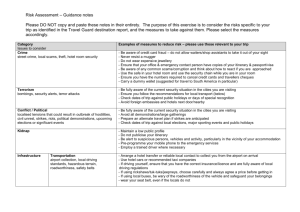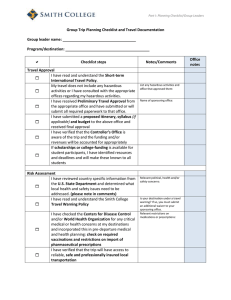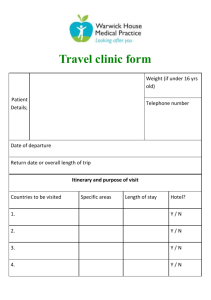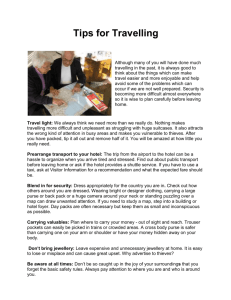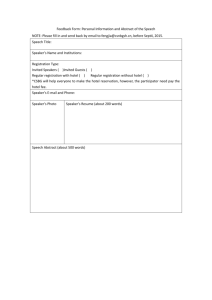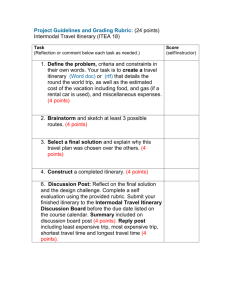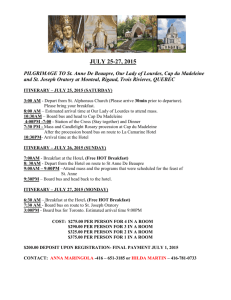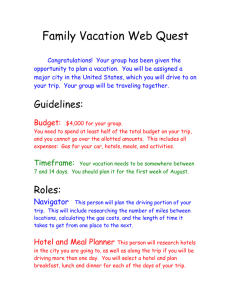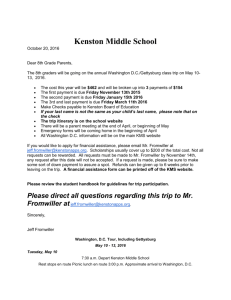Risk Assessment Guidance: Travel Safety & Security
advertisement
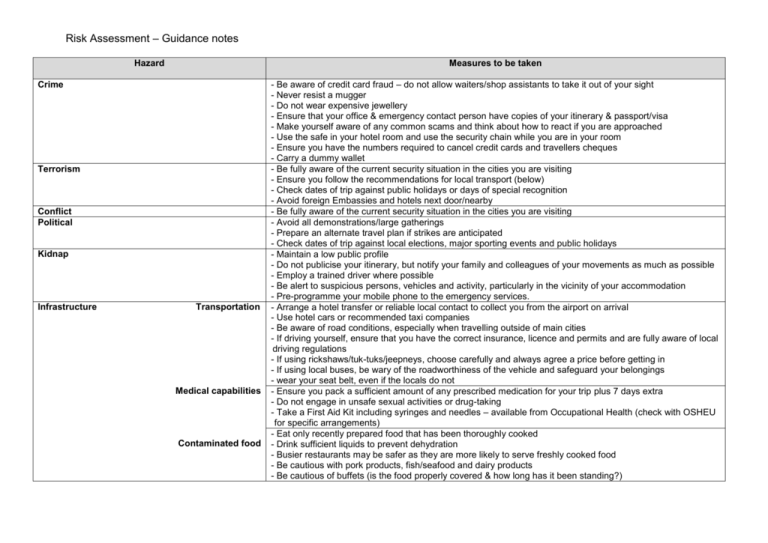
Risk Assessment – Guidance notes Hazard Measures to be taken Crime Terrorism Conflict Political Kidnap Infrastructure Transportation Medical capabilities Contaminated food - Be aware of credit card fraud – do not allow waiters/shop assistants to take it out of your sight - Never resist a mugger - Do not wear expensive jewellery - Ensure that your office & emergency contact person have copies of your itinerary & passport/visa - Make yourself aware of any common scams and think about how to react if you are approached - Use the safe in your hotel room and use the security chain while you are in your room - Ensure you have the numbers required to cancel credit cards and travellers cheques - Carry a dummy wallet - Be fully aware of the current security situation in the cities you are visiting - Ensure you follow the recommendations for local transport (below) - Check dates of trip against public holidays or days of special recognition - Avoid foreign Embassies and hotels next door/nearby - Be fully aware of the current security situation in the cities you are visiting - Avoid all demonstrations/large gatherings - Prepare an alternate travel plan if strikes are anticipated - Check dates of trip against local elections, major sporting events and public holidays - Maintain a low public profile - Do not publicise your itinerary, but notify your family and colleagues of your movements as much as possible - Employ a trained driver where possible - Be alert to suspicious persons, vehicles and activity, particularly in the vicinity of your accommodation - Pre-programme your mobile phone to the emergency services. - Arrange a hotel transfer or reliable local contact to collect you from the airport on arrival - Use hotel cars or recommended taxi companies - Be aware of road conditions, especially when travelling outside of main cities - If driving yourself, ensure that you have the correct insurance, licence and permits and are fully aware of local driving regulations - If using rickshaws/tuk-tuks/jeepneys, choose carefully and always agree a price before getting in - If using local buses, be wary of the roadworthiness of the vehicle and safeguard your belongings - wear your seat belt, even if the locals do not - Ensure you pack a sufficient amount of any prescribed medication for your trip plus 7 days extra - Do not engage in unsafe sexual activities or drug-taking - Take a First Aid Kit including syringes and needles – available from Occupational Health (check with OSHEU for specific arrangements) - Eat only recently prepared food that has been thoroughly cooked - Drink sufficient liquids to prevent dehydration - Busier restaurants may be safer as they are more likely to serve freshly cooked food - Be cautious with pork products, fish/seafood and dairy products - Be cautious of buffets (is the food properly covered & how long has it been standing?) Risk Assessment – Guidance notes Contaminated water & drinking water Utilities Natural Risks Climate conditions Natural disasters Contact with insects Contact with animals Cultural Risks Local Culture Legal differences Hazardous activities Activities Hazardous substances/chemicals Field work / research - Drink bottled water only - Use bottled water to brush your teeth - Avoid ice in drinks - Check beaches/rivers for warning signs - Check compatibility of all electrical equipment being taken - Pack sufficient torches, batteries and travel plugs - If a wall socket looks damaged or there is water damage nearby, DO NOT USE IT - Charge your mobile phone DAILY - Be aware of the weather forecasts for the dates of your trip and pack appropriate clothing - Use high-factor sunscreen and carry a bottle of water in hot conditions - Avoid strenuous activity during the hottest part of the day - Ask your hotel reception for emergency procedures - Make a note of the contact details for the local British High Commission/Embassy - Ensure that your office & emergency contact person have copies of your itinerary & passport/ visa - Ensure that you have the required inoculations before travelling and tetanus & polio are up-to-date - Consult your GP for malaria advice. Use insect repellents safely - Be aware of hotel medical provision. - Do not approach animals, even if they appear domesticated - Avoid markets where live animals and poultry are sold - Ensure that you are aware of and respect local religious restrictions and festivals - Dress appropriately at all times - Be aware of causing offence when taking photographs of local people and DO NOT take photographs near police or military establishments. - Be aware of any local laws that are different to the UK (see Local Culture section on FCO country page) - Take a copy of your prescription in your hand luggage (some medications which are legal in the UK are not legal overseas – check the embassy website of the country being visited) - Ensure that you have all the required up-to-date permits - Use recommended companies with fully-trained instructors - Check the University insurance policy coverage for the activity to be undertaken - Check beaches/rivers for warning signs - Check all safety procedures and legislation with the organisers in-country - Wear appropriate protective clothing - Ensure that you have all the required up-to-date permits - Check all safety procedures and legislation with the organisers in-country - Be aware of the location of any man-made hazards (mine shafts etc) - Make yourself aware of local animal/reptile species and the level of threat - Ensure that work sites have appropriate first-aid provision and evacuation procedures - Wear appropriate protective clothing - Be aware of hotel medical provision - Ensure you have good quality wet-weather gear and obtain tide tables Risk Assessment – Guidance notes
